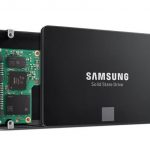Contact Us
Why You Should Buy An SSD For Your Laptop Or Pc In 2024?
SSDs are quite faster as compared to traditional storage solution HDDs. The latest SSDs tend to be much smaller and become expensive, over 2TB. However, they lose out when it comes to overall storage size, and their pricing is also high. To get optimal performance, you need a good solid-state drive (SSD). Check our comparison on SSD vs. HDD.

Benefits of Solid State Drive
Speed
SSDs come with a great benefit that files can be written sporadically across the cells with little impact on reading/times, as each cell is accessed simultaneously. This easy simultaneous access to each cell means files are read at breakneck speeds, which is faster than HDD. That’s why SSDs can make a system very fast because their ability to access data across the entire drive, known as random access, is so much faster.
Durability
As I’ve said that SSDs are faster, but SSD cells wear out over time. They push electrons through a gate to set their state, which wears on the cell and over time reduces its performance until the SSD wears out. There are also technologies like TRIM, which help keep SSDs from degrading too quickly.
Think Before Purchasing A SSD
Here are four quick tips, followed by our detailed answers to many FAQs:
- Check Your System Compatibility: Find out if you have slots for M.2 drives on your motherboard and room in the chassis. If not, you may need a 2.5-inch drive similar to HDDs in size.
- Storage capacity: If you want to future secure your device, then It’s a foolish decision to buy an SSD with less than 250GB of storage. An SSD with 500GB of storage offers a good balance between price and capacity. It gives you enough space to save your important files, movies, and games.
- SATA is cheaper but slower: If your computer supports NVMe-PCIe or Optane drives, consider buying a drive with one of these technologies. However, SATA drives are more common, cost less, and still offer excellent performance.
- Any SSD is better than a hard drive: Remember, even the worst SSD is at least three times faster than your normal HDD. If you want to store big files at less price, then HDD is all you need, but if you need performance, then SSD is always a great option for yourself.
Types Of SSD

What Capacity Do You Need?
- 250GB SSD: If you just started with SSDs, then 250GB is a better choice for you. Use it as a boot memory for your device and start feeling the speed you get with it.
- 500GB SSD: An SSD with 500GB of storage offers a good balance between price and capacity. It gives you enough space to save your important files, movies, and games.
- 1TB SSD: An SSD with 1TB is for those who want to store high-end games, movies, and big files. I personally suggest buying an extra HDD if your main purpose is storing.
Drawbacks Of SSD
Pricing
SSDs are more expensive per gigabyte as compared to HDDs. For a similar amount of storage, you could end up paying nearly twice as much for an SSD than an HDD and even more at higher capacities. But if you want high speed for your system, then SSDs are appropriate for you.
LifeSpan
According to my research, I found that HDD lasts longer compared to SSDs. The lifespan of SSD depends on how you use your device, How much data you transfer daily. Don’t overthink on lifeSpan of your SSD. It lasts enough longer and will serve you better always.
Should I Replace HDD with SSD?
An SSD can improve the performance of your laptop. Solid State Drives can cut down your system booting time significantly. An SSD based laptop can open installed software and applications with blazing speed. You will not experience any lag time while you save or move your files within SSD. All these benefits you can enjoy just with an upgrade of your traditional HDD to SSD.








